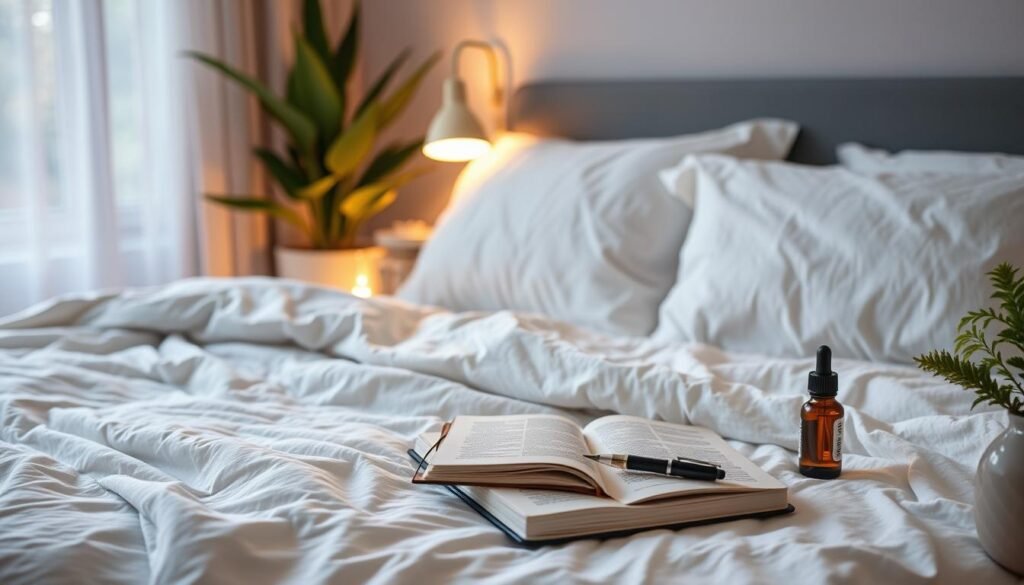Did you know that 10% to 30% of adults have trouble sleeping? Insomnia doesn’t just make you tired. It can also lead to serious health problems, affecting everything from your mood to your immune system. As more people look for ways to sleep better, it’s important to understand how insomnia works.
This guide looks at the best ways to deal with insomnia. It covers everything from cognitive behavioral therapy (CBT) to natural remedies and medicines. Our goal is to help you get back to sleeping well and feeling good.
Key Takeaways
- Cognitive behavioral therapy (CBT) is often more effective than traditional sleep medications.
- Prescription sleeping pills can assist with sleep onset and maintenance but should not be relied upon long-term.
- Alternative therapies like yoga and meditation can support sleep health, despite mixed effectiveness evidence.
- Understanding the root causes of insomnia helps guide the most appropriate insomnia management strategies.
- Natural remedies and lifestyle adjustments can make a significant difference in sleep quality.
- Qualified behavioral sleep medicine therapists are currently in limited supply in the U.S.
Understanding Insomnia and Its Impact on Health
Many people struggle with insomnia. It’s important to know why it happens, the symptoms, and how it affects health. Insomnia means you have trouble falling or staying asleep. This can cause problems during the day. It’s useful to learn about what causes insomnia to fight it better.
Common Causes of Insomnia
Insomnia comes from many sources that can mix and make things worse. The common causes are:
- Stress and anxiety from work, relationships, or everyday stress.
- Depressive disorders that mess with your sleep schedule.
- Substance use, like alcohol and caffeine, bad for sleep.
- Physical discomfort where you sleep, like bad temperature or noise.
- Irregular work schedules messing with your body clock.
Knowing these causes is the first step to fighting insomnia.
Symptoms of Insomnia and Their Effects
People with insomnia face different symptoms affecting their day:
- Excessive daytime sleepiness making you tired and unfocused.
- Irritability or mood changes that hurt your social life.
- Impaired cognitive function, affecting your job or studies.
Insomnia does more than make you tired. It can lead to serious health issues like obesity, diabetes, and heart problems. Many people will face insomnia symptoms at some time. But, about 10% to 15% have chronic insomnia. Handling insomnia is crucial for good sleep and overall health.
| Insomnia Causes | Insomnia Symptoms | Health Impact |
|---|---|---|
| Stress and Anxiety | Excessive Daytime Sleepiness | Increased risk of Chronic Conditions |
| Substance Use | Irritability | Risk of Heart Disease |
| Physical Discomfort | Impaired Cognitive Function | Weight Gain and Diabetes |
Insomnia Diagnosis: Steps to Getting Help
To find out if you have insomnia, doctors look into your sleep habits and more. They start with a thorough check-up and review how you sleep. They use questionnaires for this. These questions help figure out when you sleep and if you feel sleepy during the day.
Physical Exam and Sleep Habit Review
At your first visit, a doctor will check you to make sure nothing else is wrong. You’ll need to keep track of your sleep for a week or more. You’ll note when you sleep, if you wake up at night, and how you feel each day. This sleep diary helps understand your sleep better and make a right insomnia diagnosis.
Sleep Study Procedures
If the doctor thinks you might have another sleep problem like sleep apnea, they might suggest a sleep study. This study looks at your brain activity, heart rate, and breathing while you sleep. The information gathered helps understand if your sleep is being interrupted. This ensures the diagnosis is correct.
| Step | Description |
|---|---|
| 1. Physical Examination | Assessment to rule out underlying health problems. |
| 2. Sleep Habit Review | Use of questionnaires and sleep diaries to track sleep patterns. |
| 3. Sleep Study | Monitoring of body activities during sleep for further evaluation. |
Insomnia Best Treatment: Overview of Options
To find the right treatment for insomnia, it is essential to know the causes of sleep issues. There are many ways to address this problem, customized for each person. Behavioral therapies, especially cognitive behavioral therapy for insomnia (CBT-I), are very important. They help change bad sleep habits and deal with the mind’s role in sleep problems.
Sometimes, behavior changes alone aren’t enough. Then, medicines can help. Among the top treatments for insomnia, there are prescription and over-the-counter options. Benzodiazepines like estazolam and temazepam are used often. There are also “Z-drugs” like eszopiclone and zolpidem, which might have fewer bad effects.

New options are also available, like dual orexin receptor antagonists (DORAs) such as suvorexant and lemborexant. Antiseizure drugs, including gabapentin, help with conditions like restless leg syndrome, improving sleep. Plus, sedating antidepressants such as doxepin and trazodone are other ways to handle insomnia symptoms.
There are over-the-counter picks too, with antihistamines like diphenhydramine being popular. Melatonin and herbal supplements are natural options. But, it’s important to be careful with these because of possible side effects.
Seeing a doctor is key to finding the best solution for insomnia. A plan that includes lifestyle changes, like exercising regularly and adopting healthy sleep habits, is really effective. For more tips on how to tackle insomnia, check out this resource.
Cognitive Behavioral Therapy for Insomnia (CBT-I)
Cognitive Behavioral Therapy for Insomnia, or CBT-I, is a structured way to tackle sleep issues. It’s needed because 6-10% of people suffer from insomnia. It promises lasting sleep improvements without the side effects that drugs can cause. The advantages of CBT-I are supported by health experts. In fact, the American College of Physicians recommends it as the first choice for treating insomnia.
Benefits of CBT-I Over Medication
CBT-I stands out from traditional sleep treatments. It helps with both ongoing and temporary insomnia. Most people, about 70% to 80%, see better sleep after finishing the program. CBT-I boosts healthy sleep habits over time, unlike pills that can have drawbacks. This approach takes six to eight sessions. It’s a doable solution for those facing sleep problems.
Components of CBT-I: Techniques and Strategies
The approach to cognitive behavioral therapy for insomnia covers several areas. It includes:
- Sleep Education: This shares details about sleep cycles and why good sleep habits matter.
- Stimulus Control: This helps one link the bed with sleeping only, not staying awake.
- Sleep Restriction Therapy (SRT): This cuts down bed time to real sleeping hours to boost sleep desire.
- Relaxation Techniques: This teaches skills like deep breathing to calm sleep-related worries.
CBT-I combines these methods to change how people view sleep. This therapy tackles insomnia’s current problems and stops them from coming back. As the therapy goes on, one learns better sleep habits. This leads to better health overall.

Natural Remedies for Insomnia
Exploring natural solutions is key for those 60 million Americans fighting insomnia. These remedies range from lifestyle shifts and supplements to relaxation methods. They create a peaceful sleep setting.
Lifestyle Changes for Better Sleep
Making lifestyle adjustments can greatly help combat insomnia. Important steps include:
- Setting a consistent sleep schedule, going to bed and getting up at the same times daily.
- Adding regular aerobic exercises, which boost deep sleep, but avoiding intense workouts close to bedtime.
- Ensuring a sleep-conducive environment by keeping the room cool and dimming the lights.
- Steering clear of caffeine and nicotine before going to sleep.
Popular Natural Supplements
Some natural supplements are widely used for sleep support. Here’s a quick overview:
| Supplement | Potential Benefits | Dosage Recommendations |
|---|---|---|
| Melatonin | Regulates sleep cycles to encourage sleepiness. | 1 to 5 mg taken 30 minutes to two hours before bed. |
| Valerian Root | May enhance sleep quality and shorten the time to fall asleep. | Generally, 400 to 900 mg before bedtime. |
| Magnesium | Aids in relaxation and may lessen insomnia symptoms. | 500 mg daily for better sleep. |
| Lavender | Can improve sleep, especially for those with depression. | 20 to 80 mg daily. |
Practicing Relaxation Techniques
Adopting relaxation tactics can vastly improve one’s sleep quality. Some effective methods are:
- Meditation: Consistent practice can lead to better sleep, as shown in research.
- Deep Breathing Exercises: Calms both mind and body, preparing for rest.
- Warm Baths: A warm bath before bed helps lower your body’s temperature, signaling it’s time for sleep.
- Creating a bedtime routine: Calming activities like reading or gentle stretching before bed aid relaxation.

Effective Sleep Solutions: Prescription Medications
For many people, finding good sleep is hard. Insomnia medications can offer much-needed help. Prescription sleeping pills are a choice when other methods don’t work. These drugs come in many types, each aiming at different sleep problems. Problems like not getting to sleep or staying asleep all night.
Types of Prescription Sleeping Pills
Many prescription sleeping pills are there to choose from. Here are some common ones:
- Daridorexant (Quviviq)
- Doxepin (Silenor)
- Eszopiclone (Lunesta)
- Lemborexant (Dayvigo)
- Ramelteon (Rozerem)
- Suvorexant (Belsomra)
- Temazepam (Restoril)
- Triazolam (Halcion)
- Zaleplon (Sonata)
- Zolpidem (Ambien, Edluar, Zolpimist)
- Zolpidem extended release (Ambien CR)
Each pill works in its own way, with different benefits and risks. For example, Doxepin helps with getting and staying asleep. Triazolam is for short-term fixes for sleeplessness.
Factors to Consider When Using Medications
Choosing the right sleep medication involves many factors:
- Possible side effects like dizziness and feeling sick.
- How they might impact conditions like liver or kidney disease.
- Risks for older people and those who are pregnant or nursing.
- What your insurance will cover.
Talking to healthcare experts is key. They guide on avoiding rebound insomnia when you stop taking the meds. They also offer advice on safe use. Following their instructions ensures better results with fewer risks.
Sleep Hygiene Tips for Better Sleep Quality
Getting better sleep is important for everyone. Studies show that good sleep habits are key to fighting sleep problems in America. Some tips for good sleep include sticking to a regular sleep time, even on weekends.
To sleep better, make your bedroom a calm place. It should be dark, quiet, and cool, in the 60 to 67°F range. Try using relaxing scents like lavender to help you unwind.
Start a pre-sleep routine to tell your body it’s bedtime. This can be reading or a warm bath. Avoid screens and bright lights before bed to keep your melatonin levels right. This helps you fall asleep faster.
What you do in the day affects your sleep too. Watch your caffeine and avoid it in the afternoon and evening. Although alcohol might seem helpful, it actually disturbs sleep later. Regular exercise improves your sleep and overall health.
For more tips, visit sleep hygiene tips. Writing down your worries before bed can also help calm your mind. This makes falling asleep easier.
Alternative Therapy for Sleep Disorders
More people are turning to alternative therapies for sleep problems, like yoga, tai chi, and acupuncture. These techniques help with relaxation, which can make sleep better. Learning about these methods can show new ways to manage sleep issues.
Yoga and Tai Chi for Sleep Improvement
Yoga is becoming popular for those with sleep issues. It helps reduce stress and anxiety while promoting relaxation. Similarly, Tai Chi, known as “meditation in motion,” improves sleep too.
These activities increase mindfulness. This makes you more aware of what your body needs. In turn, this may help you sleep better.
Acupuncture and Meditation Practices
Acupuncture is another method for tackling insomnia. It aims to balance the body and may ease sleep disorder symptoms. When combined with meditation, acupuncture can greatly improve relaxation and sleep patterns.
Though people respond differently, trying both could have lasting benefits. They offer new hope in sleep disorder therapy.
If you’re looking for more information on these alternative treatments, check out reputable sources. A good place to start is this website discussing different options for insomnia.
Conclusion
Many adults in the U.S., between 50-70 million, face insomnia. It hits up to 25% of women and half of older adults. Finding the right way to deal with insomnia is key. Knowing what causes it and asking for professional advice can help sleep better.
Treating insomnia well means looking at several options. These include cognitive behavioral therapy (CBT-I), natural methods, and medications. Studies show CBT-I not only helps sleep better but its effects last. Good sleep practices and other treatments also help against insomnia.
To improve your life, finding what works for you in managing sleep is crucial. You might find relief in proven therapies or the right meds. For deeper information on handling insomnia, read this detailed article.